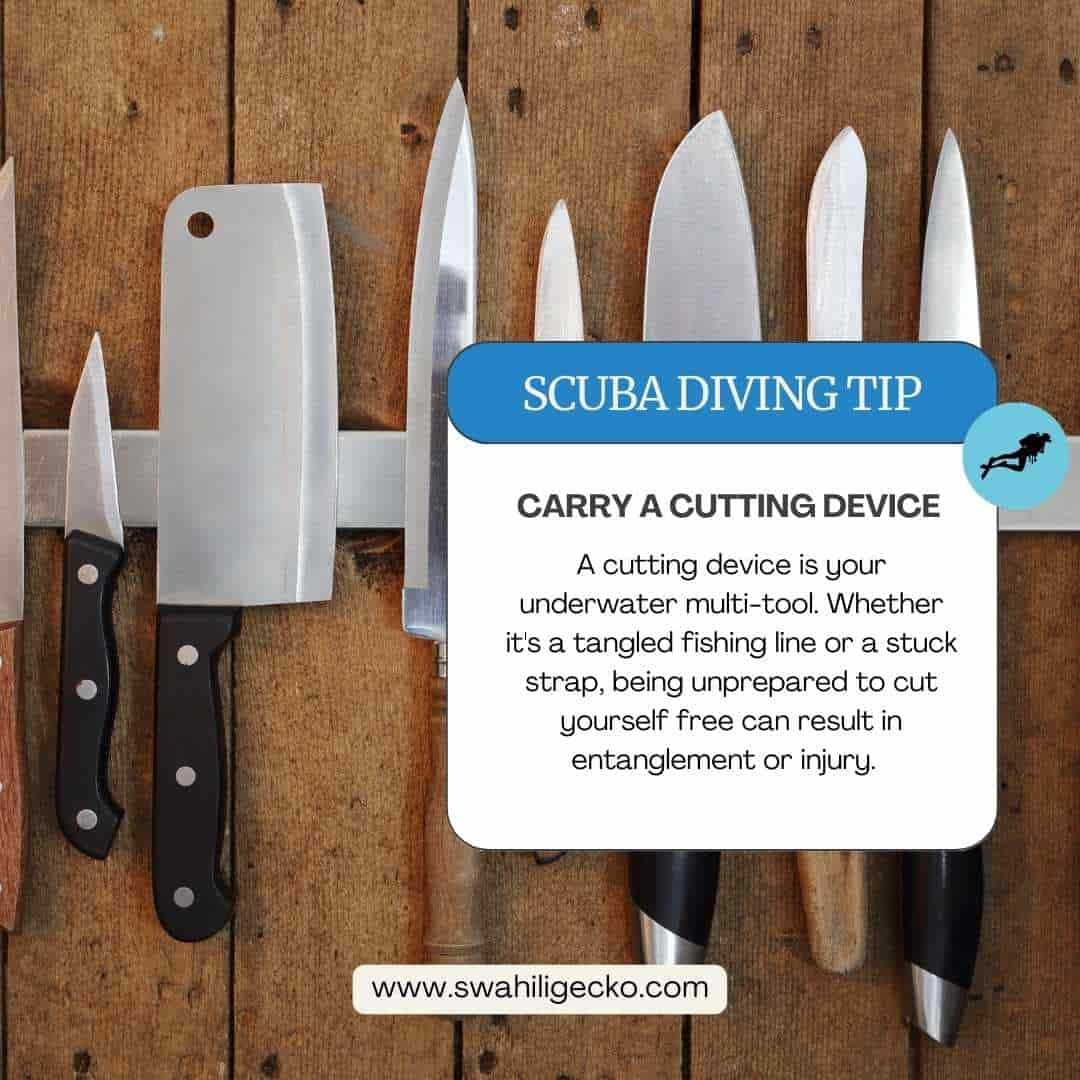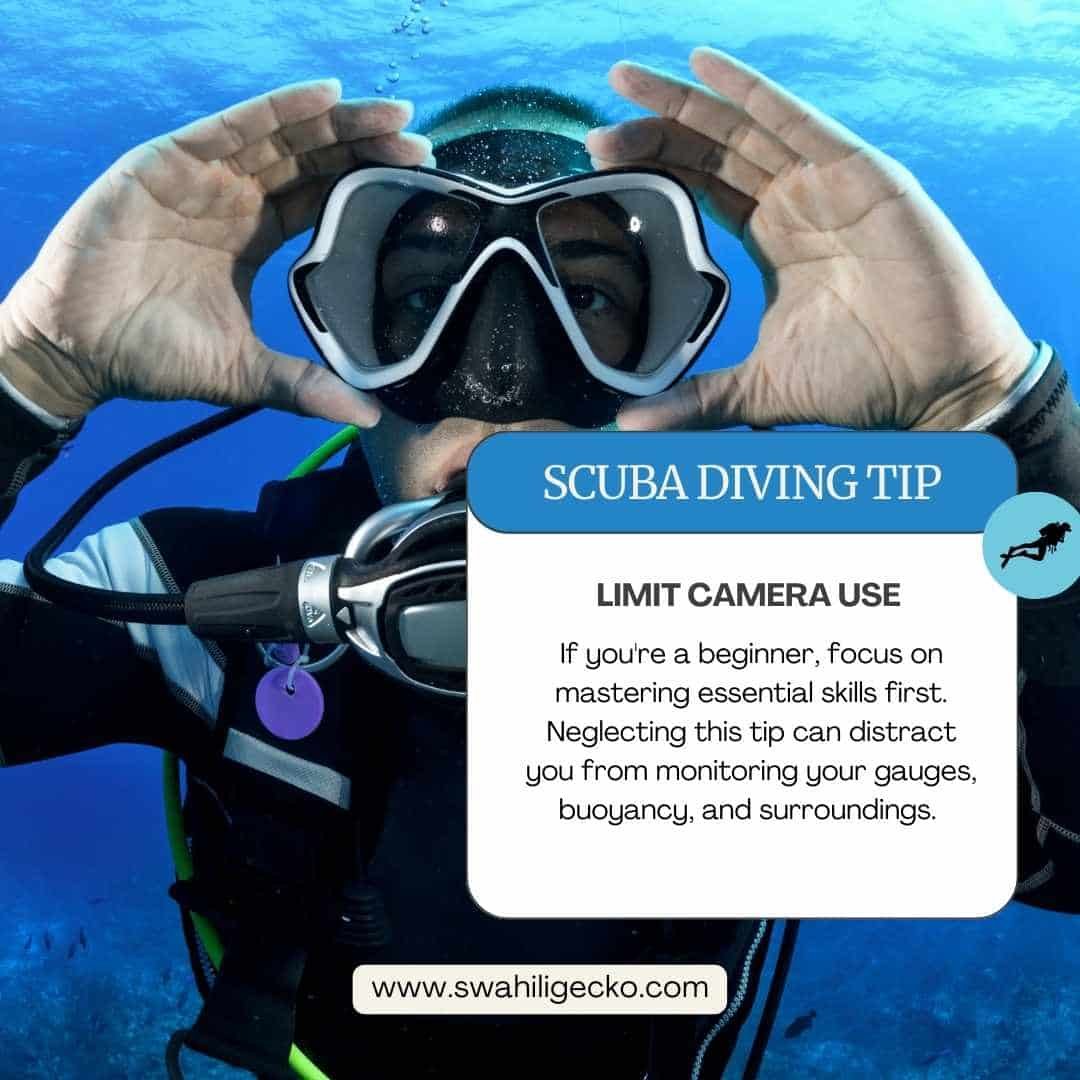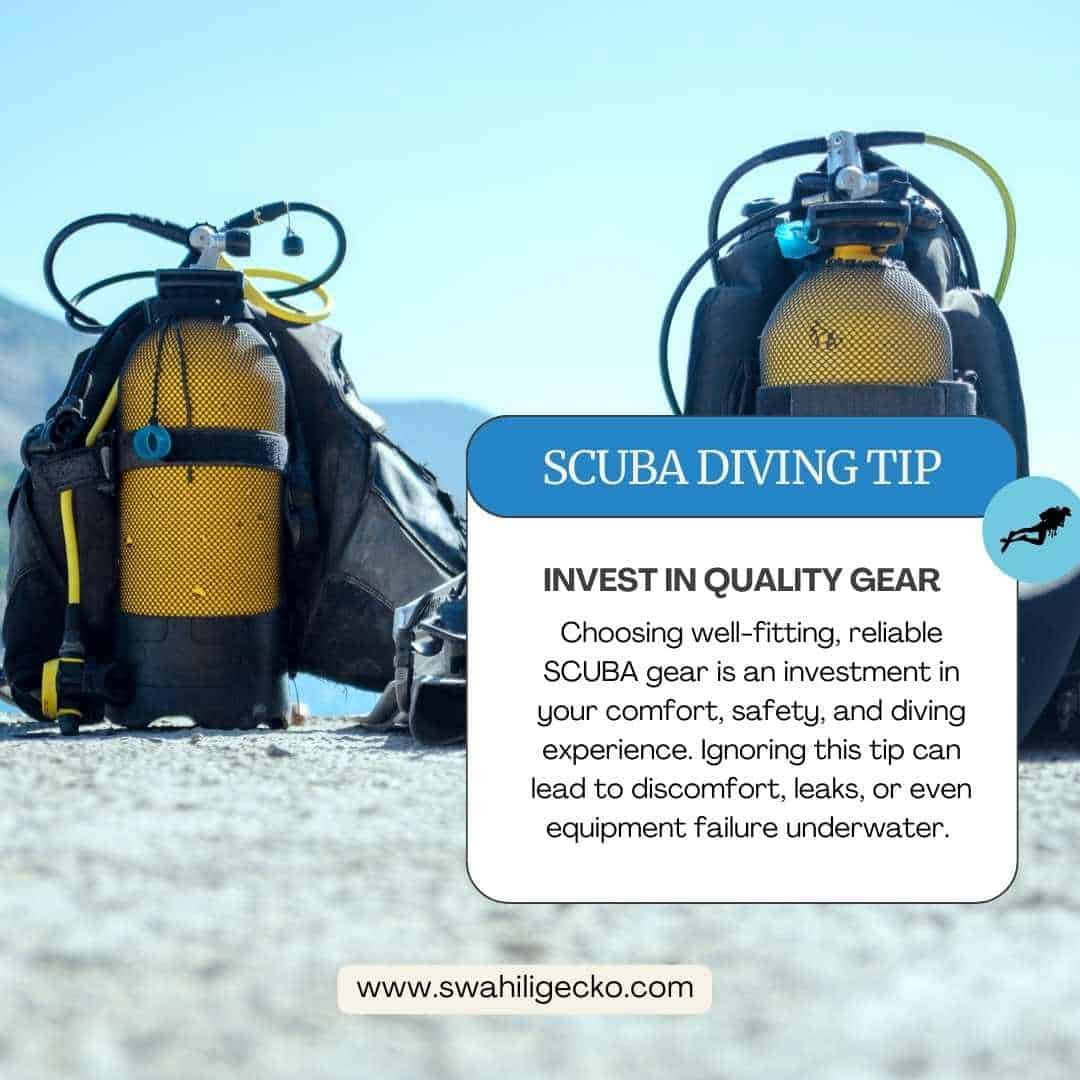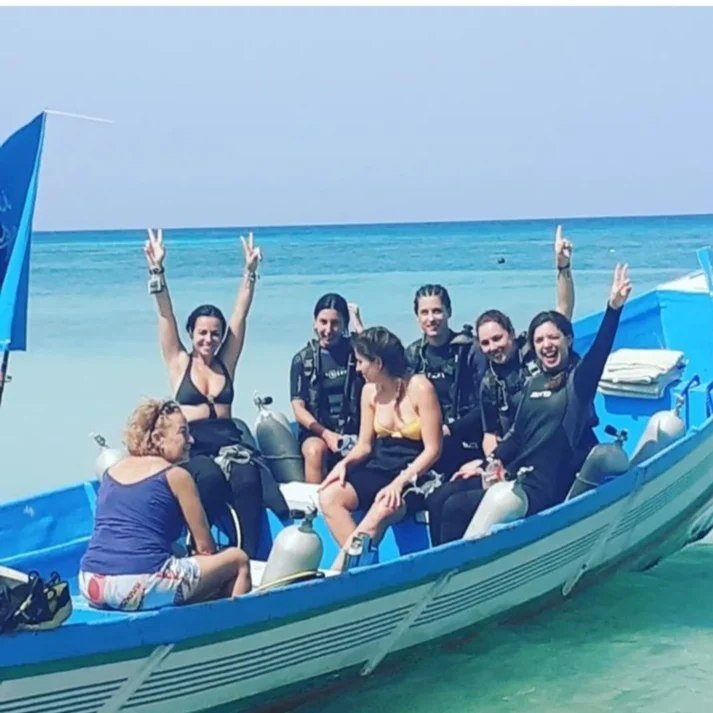23 Best Scuba Diving Tips For Beginners: Ultimate Guide to Scuba Diving
“For the rich, there is therapy. For the rest of us, there is SCUBA DIVING!”
With over 4 decades of scuba diving experience in Africa and around the world, I'm sharing 23 of the most invaluable tips that will help you navigate the underwater world with confidence.
This guide is for beginner scuba divers, although divers of all levels can pick up a lesson or two from the 23 scuba diving tips shared in this post.
Whether you're gearing up for your first dive or looking to refine your skills, these practical insights will make your diving adventures safer and more enjoyable.
Let’s dive right in!
Tip 1: Efficient Gear Preparation
Properly preparing your scuba diving gear is a crucial step that sets the tone for your entire dive. Before donning your wetsuit, lay out your equipment in a way that's easy to access.
This prevents the common mishap of realizing you've left something crucial behind while already suited up.
More than convenience, efficient gear preparation avoids unnecessary movement on a rocking boat, conserving energy and promoting safety.
Before boarding put your wetsuit on halfway up to your hips only and wear a rash guard or T shirt to prevent discomfort from extended sun exposure, and overheating. only suit up completely when ready to dive.
Learn from my mistake and prioritize a head-to-toe gear checklist. Do a full buddy check prior entering the water.
Speaking of Pemba Island, in over 4 decades of diving around the world and especially in Africa, I’ve never seen a more incredible dive paradise. Virgin healthy corals no other divers around and abundant and diverse marine life
Tip 2: Regularly Check Your Gauges
Frequent gauge checks during a dive might seem tedious, but they're a lifeline. Monitoring your air supply and depth keeps you informed and in control.
Ignoring this tip can lead to anxiety or worse, running out of air prematurely. The underwater environment is unpredictable, and conditions can change rapidly.
I vividly recall a dive where someone lost track of their air supply, causing us to surface earlier than planned. It's a mistake many beginners make, focusing solely on the beauty around them.
Establish the habit of checking your gauges regularly to avoid any uncomfortable situations.
Here are 15 of the best scuba diving sites in the world to try out your scuba diving skills.
Tip 3: Buoyancy Control And Trim
Buoyancy control is more than just maintaining your depth; it's a cornerstone of safe and enjoyable diving. Overusing your BCD (Buoyancy Control Device) inflator indicates improper weighting, lack of buoyancy control causing excess air consumption and discomfort.
Incorrect buoyancy and trim can lead to collisions with marine life or delicate coral formations, harming both you and the ecosystem.
When I started diving, I struggled with proper buoyancy, often inflating my BCD unnecessarily.
Learning to fine-tune your weighting and rely on lung volume for adjustments minimizes air usage, enhances control, and makes you a considerate diver.
Staying horizontal in the water column makes you more hydrodynamic and requires less effort to move in water.
Tip 4: Navigation Skills and Stituational Awareness
Underwater navigation might seem daunting, but it's essential for a safe and enjoyable dive.
Neglecting navigation can lead to disorientation and getting lost underwater. One of my early dives involved a group veering off course, causing confusion and stress.
Familiarize yourself with dive site maps, landmarks, and compass use. Understanding your surroundings prevents collisions with other divers and damage to the delicate underwater environment.
As you navigate, look out for fish behaviour indicating currents, enhancing your awareness and diving experience. Always be aware of your environment your body position and your buddy’s location.
Skills like these are essential for all types of dives you can think of.
Tip 5: Stay Relaxed
A relaxed diver enjoys better buoyancy, interacts more harmoniously with marine life, and conserves energy, resulting in longer and more enjoyable dives.
Staying relaxed during a dive might sound simple, but it significantly affects your overall experience. Ignoring this tip can lead to increased air consumption, exhaustion, and an overall unpleasant dive.
I vividly remember one of my first dives where I got really excited, started breathing too quickly, and ended up with a much shorter dive time.
To avoid this, consciously slow down your breathing, move smoothly, maintain neutral buoyancy and proper trim and minimize rapid movements.
This tip applies even to snorkeling. A relaxed mind is important to enjoy any water activity.
And by the way, if you’re new to snorkeling, here’s everything you need to know about snorkeling, and how it differs from scuba diving.
Tip 6: Be Mindful of Currents
Underestimating the power of currents is a common mistake among beginners. Ignoring this tip can lead to fatigue, rapid air consumption, or even drifting away from the dive site.
My personal experience involves a dive where I underestimated a strong current, causing me to struggle against it, using up the air quickly.
Learning to identify currents and adapting your diving technique helps you conserve energy and enjoy a safer, more controlled dive.
Stay close to your buddy and dive leader, and avoid fighting currents to make the most of your underwater exploration, it is easier to change direction and follow the current than swimming against it.
If you have no choice then stay as horizontal as possible, and as close to the ground as possible without touching anything.
Tip 7: Dive within Your Comfort Zone
Peer pressure or excitement might tempt you to push your limits, but diving within your comfort zone is essential. Ignoring this tip can result in anxiety, discomfort, or even accidents underwater.
I recall one of my early dives in Zanzibar, East Africa, diving with a group of divers from Australia. I felt pressured to explore a deep section of the reef beyond my experience level.
I cannot describe how nervous I was after taking that decision, and that ruined the dive experience for me. Thank God, it wasn’t a very dangerous situation.
Always communicate your comfort level and concerns with your dive group.
A confident and stress-free diver enjoys better buoyancy, air consumption, and overall safety, ensuring a memorable and enjoyable experience.
If you’re looking for new dive locations to practice your skills and live new experiences with the company of expert divers, consider Swahili Diver’s dive expositions on Pemba Island, Tanzania, Zanzibar’s undiscovered jewel.
Tip 8: Carry a Cutting Device
A cutting device or an underwater multi-tool is essential, but neglecting it can be a risky oversight. Whether it's a tangled fishing line or a stuck strap, being unprepared to cut yourself free can result in entanglement or injury.
I recall a dive where a fellow diver struggled so hard to free themselves from the fishing line. Took teamwork to get him free, a problem that a simple cutting device would’ve solved easily.
This highlights the importance of having a cutting tool readily accessible. Regularly maintain your cutting device, keep it clean, and keep it sharp, to ensure a quick and effective response in emergencies.
Tip 9: Properly Secure Gear
Securing your gear with bolt snaps or bungies isn't just about convenience; it's about safety and effective diving. Ignoring this tip can lead to accidental gear loss, tangled lines, or even entanglement in underwater obstacles.
I once witnessed a diver lose a valuable piece of equipment due to inadequate securing. Properly attached gear ensures easy access and streamlined movement underwater. If it dangles keep it on the boat
Carrying a spare bolt snap can be a lifesaver, doubling as a signaling device and offering flexibility in gear configuration.
Tip 10: Limit Camera Use
Capturing underwater moments is tempting, but beginner divers should focus on mastering essential skills first. Neglecting this tip can distract you from monitoring your gauges, buoyancy, and surroundings.
I recall a dive where a novice diver's camera fixation led to accidental contact with delicate corals.
Avoiding cameras initially allows you to concentrate on foundational diving techniques. Once you're confident in your skills, gradually integrate underwater photography into your dives.
Tip 11: Practice Regularly
Consistent practice is key to improving your diving skills, buoyancy and trim, finning techniques, and overall comfort underwater. Ignoring this tip can lead to stagnation and hamper your ability to adapt to different conditions.
Frequent practice sessions make a world of difference. Regular diving enhances your muscle memory, comfort level, and situational awareness.
Each dive builds on the last, transforming you into a more confident and capable diver.
Together with dive buddies, take a group dive in Tanzania, or anywhere else in the world that offers dive sites for practice.
Tip 12: Understand Dive Profiles
Respecting dive profiles is paramount for your safety and well-being underwater. Ignoring recommended depths and safety stops can result in decompression sickness, a painful and potentially life-threatening condition.
I vividly remember a dive where a diver exceeded their maximum depth, leading to an extended decompression obligation. Familiarize yourself with dive tables, computers, and safety guidelines to ensure a risk-free and enjoyable dive.
Tip 13: Prioritize Safety Stops
Including safety stops in your dive profile isn't optional; it's a fundamental practice to prevent decompression sickness. Ignoring this tip can lead to dangerous nitrogen buildup in your body, causing painful symptoms.
I've personally experienced the discomfort of skipping a safety stop in my younger days, and I can attest to the importance of adhering to them. These stops allow your body to off-gas excess nitrogen safely, reducing the risk of decompression sickness.
Tip 14: Practice Buoyancy and Trim
Buoyancy control and trim isn't just about staying level; it impacts your air consumption and overall comfort underwater. Ignoring this tip can lead to poor buoyancy, increased air usage, and damage to marine life or the underwater environment.
Early in my diving journey, I struggled with buoyancy and trim and stayed vertical or at 45 degrees, affecting my enjoyment and the marine environment.
Mastering buoyancy and trim enhances your underwater experience, enables you to glide effortlessly, and minimizes your impact on delicate ecosystems.
Tip 15: Learn Underwater Communication
Mastering underwater signals is a critical skill for effective communication with your dive buddy and fellow divers. Neglecting this tip can lead to confusion, missed interactions, or even potential hazards. Always discuss and agree on hand signals prior to entering the water.
I recall a dive where poor communication caused a buddy separation scare. Learning and using standardized signals creates a seamless way to convey information underwater, ensuring safety, collaboration, and shared experiences.
Tip 16: Invest in Quality Gear
Choosing well-fitting, reliable SCUBA gear is an investment in your comfort, safety, and diving experience. Ignoring this tip can lead to discomfort, leaks, or even equipment failure underwater. Scuba Gear is Life Saving Gear.
I've had my share of gear-related mishaps, which taught me the importance of investing in quality equipment. Prioritize fit and functionality over aesthetics, and consult experienced divers or professionals to make informed gear choices.
Tip 17: Keep Feet Clean
Properly fitting and clean gear is essential for a comfortable dive. Neglecting foot hygiene can result in discomfort, blisters, and even infections.
I remember a dive where sand in my boot caused persistent discomfort throughout the underwater journey. Prevent this by rinsing your feet, shaking out your boots, and ensuring a snug fit before every dive.
Tip 18: Prioritize Safety Briefings
Listening attentively during safety briefings sets the groundwork for a successful dive. Ignoring this tip can lead to confusion, misunderstanding dive plans, and potential hazards.
I recall a dive where a lack of attention resulted in diver disarray underwater. Fully understand the dive plan, hand signals, emergency procedures, and potential risks of scuba diving to ensure a safe and enjoyable dive.
Tip 19: Stay Hydrated
Hydration is crucial before and after diving to maintain your well-being. Neglecting this tip can lead to dehydration, fatigue, and reduced cognitive function underwater. Remember the gas you are breathing underwater is 100% dry.
I've experienced the effects of mild dehydration during a dive, and it significantly impacted my comfort and focus. Prioritize water intake, especially in warm climates, to ensure optimal physical and mental performance during your dives.
Tip 20: Properly Maintain Equipment
Caring for your equipment prolongs its lifespan and ensures your safety underwater. Ignoring this tip can lead to gear malfunction, corrosion, or discomfort during dives.
I've learned the hard way that skipping equipment maintenance can result in unpleasant surprises underwater. Rinse your gear thoroughly with fresh water after each dive, inspect for damage, and store it properly to avoid unnecessary wear and tear.
Tip 21: Respect Marine Life
Being a responsible diver means showing respect to the underwater world you explore. Ignoring this tip can lead to irreversible damage to delicate marine ecosystems. Witnessing careless divers touching coral or harassing marine life is disheartening.
Educate yourself on responsible diving practices, maintain proper buoyancy and trim as well as finning techniques to avoid touching the reef, and follow ethical guidelines to preserve the underwater environment for generations to come.
Remember that scuba diving is not just a sport; it's a way to connect with nature, develop new skills, and gain a deeper understanding of the ocean's beauty and fragility.
Tip 22: Manage Your Air Consumption
Controlling your breathing is a skill that improves with practice and mindfulness. Ignoring this tip can lead to rapid air consumption, cutting your dive short.
Here are top freediving breathing exercises every diver should use.
During one of my early dives, I focused too much on the surroundings, leading to an increased breathing rate.
Practice slow, deep breaths, and avoid unnecessary breath hold to conserve your air, extend your dive time, and enjoy the underwater world longer.
Learn how to calculate your Surface Air Consumption to educate yourself on how to prolong a dive, becoming a better planner and more safety conscious. with every log entry calculate your SAC rate and understand the meaning.
Tip 23: Plan Surface Intervals
Surface intervals between dives are essential for your safety and well-being. Ignoring this tip can lead to fatigue, hypothermia, and increased susceptibility to decompression sickness, or even accidents.
I recall a dive trip where I didn't adequately rest between dives, and it impacted my energy body heat and focus. Use surface intervals to rehydrate, eat light, recover core body heat, and rest, ensuring you're in the best shape for your next dive.
Bonus: Get your Scuba Diving Certification
Don’t even think about diving if you don’t have your dive certification. Thankfully, there’s no age limits. If you’re reading this post, you’re old enough to scuba dive — with your certification.
Frequently Asked Questions (FAQs)
Have more questions about scuba diving? Check out our FAQ to see if we sorted that out for ya!
Is scuba diving difficult for beginners?
Scuba diving can seem daunting for beginners, but with proper training, practice, and adherence to safety guidelines, it becomes an accessible and enjoyable activity.
Taking a beginner's diving course and diving certification will provide you with the necessary skills and knowledge to start your diving journey confidently.
A good place to start is with the Swahili Diver’s beginner dive course on Pemba Island using the UNIQUE RAID WAY. Contact us today to learn more about the course.
How can I overcome equalization issues?
Equalizing your ears is essential to prevent discomfort and potential injury while descending.
To overcome equalization issues, start equalizing early softly and frequently, using methods like the Valsalva manoeuvre or the Frenzel manoeuvre.
If you're struggling, ascend slightly and try again. Patience and practice are key. Do not push yourself
What should I do if I feel claustrophobic underwater?
Feeling claustrophobic underwater is not uncommon, especially for beginners. Focus on your breathing and relax.
If you feel uneasy, signal your buddy or dive guide, and consider ascending to shallower depths where you'll feel more comfortable. Overcoming claustrophobia requires practice and gradually increasing your comfort level.
How do I prevent mask fogging?
Mask fogging can hinder your visibility underwater. To prevent it, use an anti-fog solution or saliva before your dive.
Avoid touching the inside of your mask, as this can transfer oils that contribute to fogging. Always treat the lens of a new mask, never dive with an out of the box mask
If your mask does fog, signal your buddy, rinse and clear the fog by lifting the bottom of your mask sloshing water inside and clearing it, or remove completely, lick the inside lens and replace and clear.
Can I dive if I'm not a strong swimmer?
Being a strong swimmer is beneficial for diving, but it's not a strict requirement.
Scuba diving relies more on buoyancy and trim control and proper finning technique than traditional swimming strokes. However, comfort in the water is essential.
If you're not a good swimmer, consider taking swimming lessons to boost your confidence.
What's the best way to handle underwater currents?
Underwater currents can be challenging, especially for beginners. The key is to go with the flow and avoid fighting the current, which can lead to exhaustion.
Maintain a streamlined body position neutral buoyancy and trim and use natural features, like rocks, to shield yourself from the current. If unsure, consult your dive guide or instructor for guidance.
Is it necessary to dive with a buddy?
Diving with a buddy is a fundamental safety practice.
Having a buddy ensures that there's someone to assist you in case of emergencies, share experiences, and provide an additional layer of awareness. Solo diving requires advanced specialized training.
Conclusion
Each dive presents a unique opportunity to explore the mysteries of the underwater world.
By incorporating the 23 essential scuba diving tips for beginners, you're not only ensuring your safety and comfort but also maximizing your enjoyment and appreciation of this incredible adventure.
Want to take your scuba diving experience to the next level or eager to try out new dive locations?
Consider the Islands off the coast of East Africa, home to some of the most spectacular reefs and beaches in the world. Scuba dive in newer, virgin sites like Pemba Island, and Zanzibar can provide unforgettable experiences.
Contact us at Swahili Divers for more details and guides on scuba diving in East Africa.
